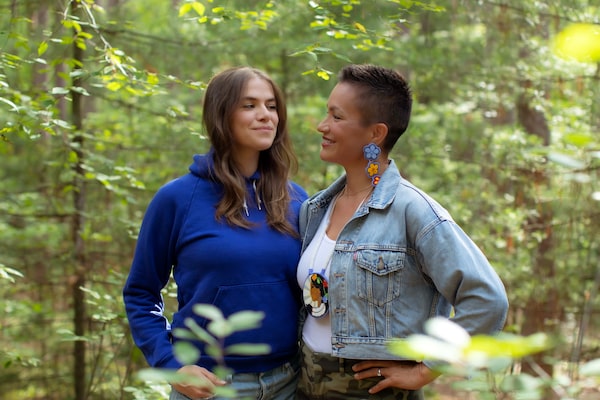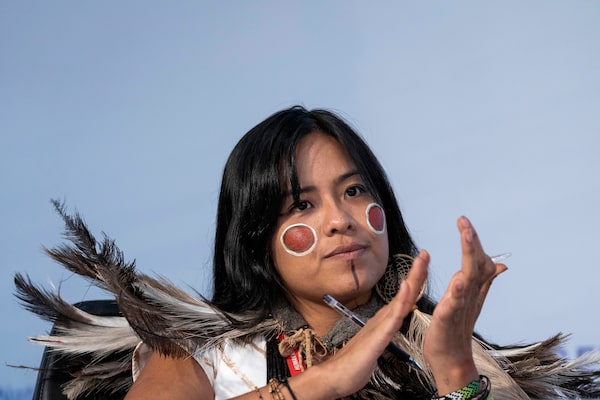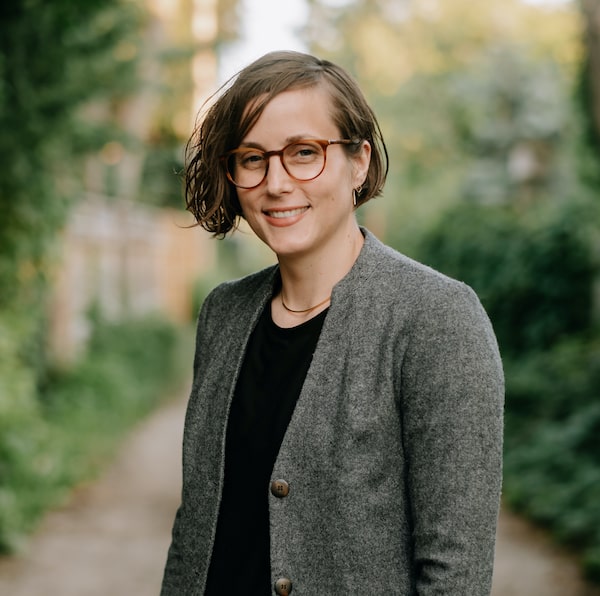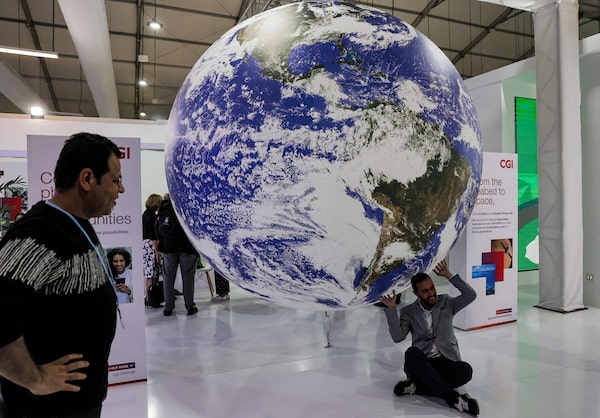If you’re reading this on the web or someone forwarded this e-mail newsletter to you, you can sign up for Globe Climate and all Globe newsletters here.
Good afternoon, and welcome to Globe Climate, a newsletter about climate change, environment and resources in Canada.
A decade ago, Idle No More made Indigenous issues visible in a new way, and photography was vital to that – as it was in other moments of defiance to colonialism. By letting the subjects themselves speak to these six historical images, and showing them as they are today, we can take viewers a step closer to empathy – and maybe even understanding.
Now, let’s catch you up on other news.


ABOVE: Waneek Horn-Miller, 14, clutches her sister Kaniehtiio Horn, 4, after a soldier had stabbed the former with a bayonet on Sept. 26, 1990, the last day of the Oka Crisis. Ryan Remiorz/The Canadian Press BELOW: The sisters embrace outside of Ottawa. Kaniehtiio (left) is now a television actor and Waneek, a former member of Canada’s Olympic water polo team, promotes sports in Indigenous communities. Nadya Kwandibens/Red Works Photography
Noteworthy reporting this week:
- Carbon dioxide emissions: Edmonton declared a climate emergency. Its climate budget shows it’s not on track to meet its goals
- Environment: Congo Basin, the world’s second-biggest rainforest, is now reported to be facing rapid destruction. Also: Rainforest nations Brazil, Democratic Republic of Congo and Indonesia form alliance to save jungle.
- From space: Canadian satellite spies ‘significant’ emission of methane from Quebec landfill site
- Art: Climate activists throw maple syrup on Emily Carr painting at Vancouver Art Gallery. Last week, the famed painting The Scream was also targeted by climate activists
- COP27: Today, Germany and other G7 countries, alongside Ghana and the V20 group of vulnerable countries, unveiled plans to launch a “Global Shield” against climate risks. Northern delegates brought an Indigenous, youth perspective to the climate summit this year. Finance also took centre stage in Egypt, as developing countries sought more detail. However, there remained slow progress which stoked worry over a final deal, as talks enter the homestretch with key issues unresolved
- Analysis from The Narwhal: ‘Appeals are not allowed’? Defying residents’ choice, Doug Ford orders Hamilton to allow sprawl
A deeper dive
Meet The Globe’s environment reporter
Wendy Stueck is not unfamiliar with the work we do. For this week’s deeper dive, she talks to you about what to expect from her new role.
Hello from Vancouver, where I will be based as the most recent addition to The Globe and Mail’s climate and environment team.
I’ve reported on various issues for The Globe from our B.C. bureau, including housing, forestry and labour, with coverage ranging from a story about the politics of Dr. Seuss’s Yertle the Turtle to, with my colleague Mike Hager, a look at housing conditions in Vancouver’s Downtown Eastside.
For the past two years, I’ve focused primarily on Indigenous business – looking at systemic issues, including access to capital and how corporate Canada is responding to the Calls to Action from the Truth and Reconciliation Commission with new approaches to development and partnerships.
I’ve looked at how Indigenous women are supporting each other as entrepreneurs and how an Indigenous woman, Margaret Kenequanash, is a key player in putting together a landmark deal to connect remote communities to Ontario’s power grid.
Most recently, I covered an announcement University of British Columbia about a biofoam project between UBC researchers and the Wet’suwet’en First Nation. It is a fledgling venture without capital, customers or a business plan – but I wanted to cover it because of its approach to Intellectual property – that it will be shared by UBC and the First Nation.
Worldwide, there’s growing recognition that Indigenous people’s contributions to research have on occasion been minimized or overlooked. There are also concerns about protecting cultural knowledge; the National Indigenous Economic Strategy for Canada (which I also wrote about notes that First Nations, Inuit and Métis people struggle with existing legal regimes and called for an Indigenous Knowledge Institute to focus on the issue. (Canada’s Intellectual Property Strategy, introduced in 2018, includes several initiatives aimed at addressing Indigenous IP concerns.)
I plan to keep reporting on Indigenous business and communities, as they are inextricably linked to issues related to climate change and the environment, including how to recover from devastating forest fires or if and how kelp can help restore coastal environments and economies.
I hope you’ll send story ideas and feedback.
- Wendy
What else you missed
- What else you missed at COP27: Developing nations criticize Big Oil, wealthy governments for driving global warming. UN advisory panel calls on governments to force companies to develop serious net-zero plans
- U.S. at COP27: U.S. climate envoy John Kerry launched carbon offset plan. Biden said climate efforts ‘more urgent than ever’ in COP27 speech
- Canada, Nigeria target oil and gas methane emissions with new laws
- Environmental group takes federal government to court over rules meant to protect endangered shorebird
- World’s dash to source more natural gas endangers climate goals, report says
- Environmental campaigners celebrated as plans for world’s northernmost oil field in doubt as costs soar
- China would be willing to contribute to climate damage compensation, envoy says
- California voters weigh new tax on rich to boost EV adoption
- Rains from Hurricane Nicole douse eastern seaboard from Georgia into Canada
- B.C. agriculture minister says sector is recovering well on flooding anniversary

Taily Terena, Indigenous Rights Activist, WECAN Coordinator in Brazil, claps during a panel on Indigenous Women from the Amazon, at COP27 in Sharm el-Sheikh, Egypt. Nov. 14, 2022.Nariman El-Mofty/The Associated Press
Opinion and analysis
Marsha Lederman: Climate change demands a united, global response. Rich countries aren’t doing enough
Donna McMahon and Suzanne Senger: Rain returns to B.C.’s Sunshine Coast but impact of the recent drought continues
Axel van Trotsenburg: Where is the money? A call for transparency in climate finance at COP27
Eric Reguly: How China could play the climate disaster loss and damage game to its geopolitical advantage
Adam Radwanski: Ottawa seems confused about how to strengthen its carbon pricing system
Green Investing
What are the best sustainable investing strategies? Seven money managers get to test theirs
Seven investment managers have scored mandates to manage a total of $104.5-million for a group of institutional investors after impressing judges with strategies for setting up portfolios offering both financial gains and credibility in environmental, social and governance measures. After being shortlisted last spring, 11 finalists gave in-person presentations of their strategies to expert judges.
The aim was to highlight best practices in a field that can be confusing, even for pros, because of numerous different standards for measuring everything from climate risks, to worker safety, to equity and diversity.
- Young money: We can’t solve our wallet problems by neglecting our climate problems
- Money before climate; market downturn spurs ESG fund exodus
Making waves
Each week The Globe will profile a Canadian making a difference. This week we’re highlighting the work of Brianna Salmon supporting community-led climate action.

Brianna Salmon, Executive Director at Green Communities Canada.Hugh Whitaker/Supplied
Hey, I’m Brianna Salmon, 39, and I’m the executive director at Green Communities Canada.
Local communities are on the frontlines of climate change, and there is an urgent need to ensure they have the resources, capacity and expertise required to accelerate action. As the executive director of GCC, I work with my team to directly support community-led climate action by providing local NGOs with evidence-informed program models, technical training, communications and campaign strategies, and continuing peer-to-peer networking.
The current focus of my work is to strengthen relationships among grassroots climate initiatives. My goal is to build a collaborative movement grounded in the needs of communities from coast to coast to coast. I also work directly with future climate leaders and support postecondary students’ involvement in local climate action activities. I believe we need to support young people in their efforts to fight the climate crisis, because they are ultimately going to be fighting for our future as well.
- Brianna
Do you know an engaged individual? Someone who represents the real engines pursuing change in the country? Email us at GlobeClimate@globeandmail.com to tell us about them.
Photo of the week

An attendee poses for a photo beneath an installation depicting the planet Earth globe during the COP27 climate conference at the Sharm el-Sheikh International Convention Centre, in Egypt. Nov 9, 2022.AHMAD GHARABLI/AFP/Getty Images
Catch up on Globe Climate
- A vibe check at COP27 in Egypt
- A postcard from Alberta’s Energy Transition Corridor road trip
- What Canada can learn from European energy planning
- Yukon River Chinook salmon decline is a cultural, spiritual loss
We want to hear from you. Email us: GlobeClimate@globeandmail.com. Do you know someone who needs this newsletter? Send them to our Newsletters page.